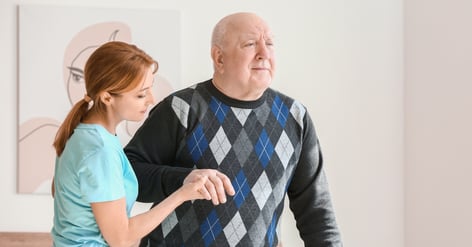Neurological disorders can significantly impact a person's mobility and balance. The right footwear can play a crucial role in improving stability, reducing the risk of falls, and enhancing overall comfort. In this blog post, we'll explore the benefits of specialized footwear for individuals with neurological conditions such as Parkinson's disease and stroke.

Why Specialized Footwear Matters
Neurological disorders can often lead to a variety of foot and ankle issues, including:
- Foot Drop: Difficulty lifting the front part of the foot.
- Muscle Weakness: Reduced strength in the foot and ankle muscles.
- Balance Impairment: Difficulty maintaining balance and coordination.
- Sensory Loss: Decreased sensation in the feet.
Specialized footwear can help address these issues by providing:
- Enhanced Stability: Features like wider bases, rocker soles, and heel stabilizers can improve balance and reduce the risk of falls.
- Improved Gait: Proper footwear can help correct gait abnormalities and improve walking patterns.
- Increased Comfort: Cushioning, support, and adjustable closures can enhance comfort and reduce pain.
- Reduced Risk of Injury: Well-fitting shoes can protect the feet from blisters, calluses, and other injuries.
Shoes for Parkinson's Disease
Individuals with Parkinson's disease often experience tremors, rigidity, and balance problems. The right footwear can help alleviate these symptoms and improve mobility.
Key Features to Look For:
- Stability: A wider base and a rocker sole can provide better stability and reduce the risk of falls.
- Cushioning: Adequate cushioning can absorb shock and reduce discomfort.
- Adjustable Closures: Velcro straps or elastic laces can make it easier to put on and take off shoes.
- Slip-Resistant Soles: Non-slip soles can help prevent slips and falls.
Shoes for Stroke Survivors
Stroke survivors may experience a variety of foot and ankle problems, including weakness, spasticity, and sensory loss. Specialized footwear can help address these issues and improve mobility.
Key Features to Look For:
- Support: A supportive upper and a sturdy sole can provide stability and comfort.
- Adjustable Closures: Velcro straps or elastic laces can make it easier to put on and take off shoes.
- Wide Fit: A wider fit can accommodate swollen feet or orthotic devices.
- Non-Slip Soles: Non-slip soles can help prevent slips and falls.
Shoes for Multiple Sclerosis (MS)
Individuals with MS may experience weakness, fatigue, and balance problems. Shoes with good arch support, cushioning, and stability features can help alleviate these symptoms.
Key Features to Look For:
- Arch Support: Proper arch support can help reduce foot pain and fatigue.
- Cushioning: Cushioning can absorb shock and reduce discomfort.
- Stability: A stable base can help improve balance and reduce the risk of falls.
- Lightweight: Lightweight shoes can reduce fatigue and improve comfort.
Shoes for Cerebral Palsy
Individuals with cerebral palsy may have varying degrees of motor impairment, including foot deformities and muscle weakness. Custom orthotics and specialized footwear can help improve gait and reduce pain.
Key Features to Look For:
- Custom Orthotics: Custom orthotics can provide individualized support and correction for foot deformities.
- Adjustable Closures: Velcro straps or elastic laces can make it easier to put on and take off shoes.
- Wide Fit: A wider fit can accommodate foot deformities and provide extra room for toes.
- Durable Materials: Durable materials can withstand wear and tear from increased use.
Shoes for Spinal Cord Injuries
People with spinal cord injuries may experience paralysis or weakness in their legs. Shoes with proper support, stability, and adjustable closures can help improve mobility and prevent foot ulcers.
Key Features to Look For:
- Heel and Ankle Support: Proper support can help prevent foot drop and improve stability.
- Adjustable Closures: Velcro straps or elastic laces can make it easier to put on and take off shoes.
- Wide Fit: A wider fit can accommodate orthotic devices or swollen feet.
- Non-Slip Soles: Non-slip soles can help prevent falls.
Consulting with a Healthcare Professional
Before purchasing specialized footwear, it's essential to consult with a healthcare professional, such as a physical therapist or podiatrist. They can assess your specific needs and recommend the most appropriate footwear options.
By investing in the right footwear, individuals with neurological disorders can improve their quality of life, reduce the risk of falls, and enjoy greater independence.


.png?width=116&name=Anodyne_circle_1_logo%20(2).png)
